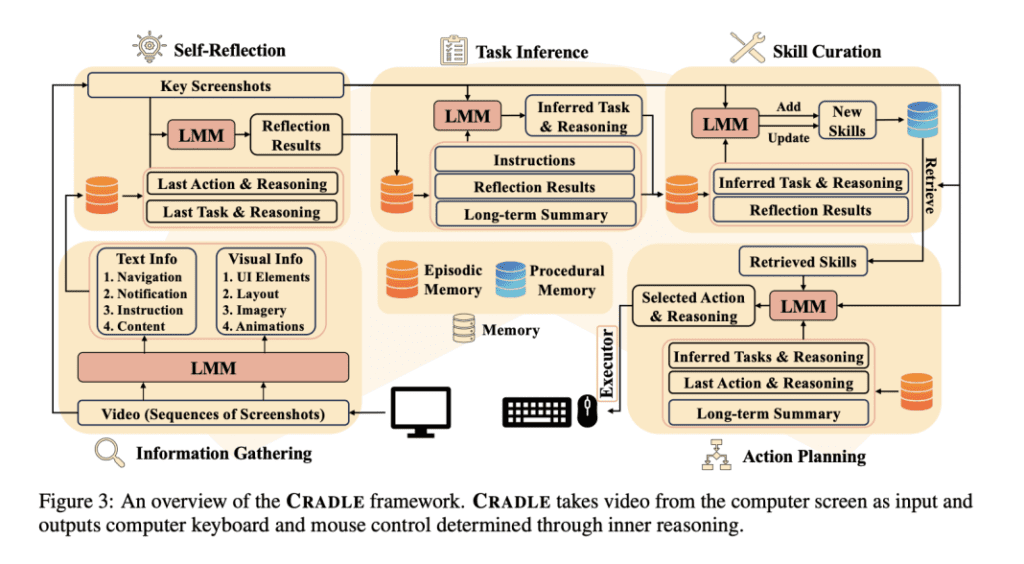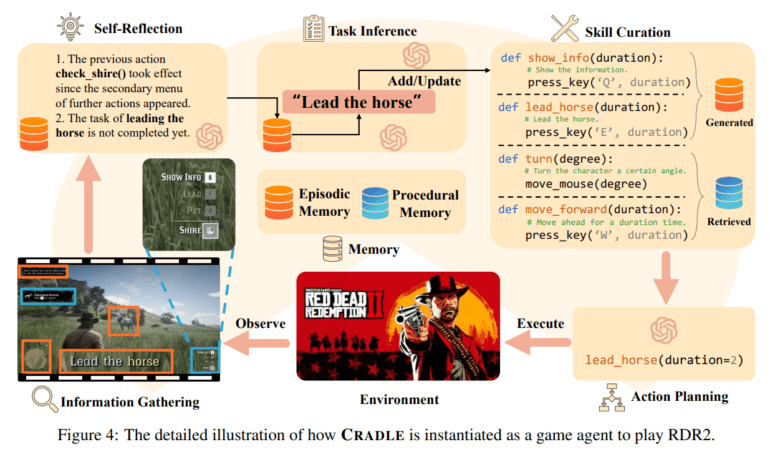- CRADLE offers a groundbreaking solution for mastering computer tasks through the GCC paradigm.
- It addresses challenges like managing multimodal observations, ensuring precise control, and fostering long-term memory and reasoning.
- CRADLE’s modules focus on information gathering, self-assessment, task inference, skill development, action planning, and memory utilization.
- Its application in Red Dead Redemption II showcases its potential in navigating complex virtual environments.
- CRADLE’s information-gathering module extracts pertinent data from screen images for context comprehension.
- Skill and action generation mechanism enables nuanced interaction through keyboard and mouse commands.
- Reasoning modules assess outcomes and devise strategies based on past experiences.
- Quantitative evaluations reveal proficiency in task completion, albeit with identified areas for improvement.
Main AI News:
In the pursuit of attaining Artificial General Intelligence (AGI), foundational agents have exhibited potential in managing intricate scenarios and operations through the utilization of expansive multimodal models (LMMs) and sophisticated tools. Nonetheless, these agents often encounter obstacles when attempting to generalize across diverse scenarios, primarily due to the significant variations in observations and actions demanded across different environments. Addressing this challenge, researchers advocate for the utilization of the General Computer Control (GCC) paradigm.
GCC, an innovative approach aimed at mastering any computer-based task, revolves around interpreting screen images (and potentially audio) and translating them into keyboard and mouse inputs, mirroring human-computer interaction. Key challenges in realizing GCC encompass managing multimodal observations, ensuring precise control of input devices, fostering long-term memory and reasoning capabilities, and promoting efficient exploration and self-enhancement.
The CRADLE framework, depicted in Figure 3, emerges as a pioneering solution to these challenges. Comprising six core modules focusing on information acquisition, self-assessment, task inference, skill development, action planning, and memory utilization, CRADLE offers a novel paradigm for comprehending and engaging with digital environments. The application of this framework in the intricate AAA game Red Dead Redemption II, illustrated in Figure 4, highlights its potential to navigate, learn, and excel within complex virtual worlds devoid of prior in-depth knowledge of the game mechanics.
CRADLE’s information-gathering module analyzes screen images to extract pertinent information, encompassing both textual and visual data, enabling the framework to grasp the current context and strategize accordingly. Particularly noteworthy is the mechanism for skill and action generation, which translates in-game instructions into executable keyboard and mouse commands, facilitating nuanced and efficient interaction. This interaction is further honed through reasoning modules, which assess the consequences of actions and devise future strategies based on acquired information and past experiences.
Quantitative assessments of CRADLE in Red Dead Redemption II demonstrate its ability to proficiently execute various tasks with minimal reliance on prior knowledge, representing a significant stride towards realizing GCC. However, the implementation also exposes shortcomings in spatial perception, icon interpretation, and historical data processing, highlighting avenues for further enhancement. Despite these challenges, CRADLE’s performance underscores the viability of LMM-based agents in following and accomplishing real missions within complex games, offering valuable insights for the development of more adaptable and potent agents for computer control tasks.

Source: Marktechpost Media Inc.
Conclusion:
CRADLE’s innovative framework signifies a leap forward in efficient digital control, promising enhanced capabilities in navigating complex environments. Its successful application in real-world scenarios like gaming highlights its potential for diverse industries seeking advanced computer control solutions. Businesses investing in CRADLE technology can anticipate heightened operational efficiency and adaptability in navigating digital landscapes.

